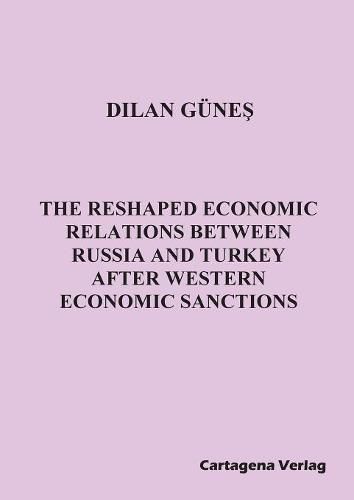Readings Newsletter
Become a Readings Member to make your shopping experience even easier.
Sign in or sign up for free!
You’re not far away from qualifying for FREE standard shipping within Australia
You’ve qualified for FREE standard shipping within Australia
The cart is loading…






This title is printed to order. This book may have been self-published. If so, we cannot guarantee the quality of the content. In the main most books will have gone through the editing process however some may not. We therefore suggest that you be aware of this before ordering this book. If in doubt check either the author or publisher’s details as we are unable to accept any returns unless they are faulty. Please contact us if you have any questions.
Economic sanctions as a foreign policy tool is used by sender countries to change policy or behavior of a target country. The economic sanctions are multilevel phenomena that not only affects both sides of the action but also have implications for third parties, reshaping the political and economic relations of the sender and target countries with the other states. The effects of the economic sanctions imposed by the West on Russia and Turkey have direct implications for the balance of power in the region and globally. Therefore, this paper aims to examine how did economic sanctions (re)shape the economic relations between Russia and Turkey. In doing so, the paper applies explanatory sequential mixed methods. First, logarithmic regression model was conducted by time series data over the period ranging from 1992 to 2018. The paper confirms that economic sanctions imposed on target countries that already have trade relations increase the bilateral trade between them, especially for Turkish case. Subsequently, content analysis was conducted reviewing annual data starting from 1992 but mostly focusing on 2014-2018 period. The analysis shows that because the sender countries are important trade partners in the target countries, to counterbalance the effects of economic sanctions target countries choose to diversify their trade. According to the results, Russia diversified towards Asia and Central Asia while Turkey increased its trade with the EU which is mutual ally of the US and Turkey. Excluding the 2015 plane crisis between Russia and Turkey, the Western sanctions imposed on both countries increased the bilateral trade between them. However, these two countries are the first choice of each other when it comes to trade partner diversification.
$9.00 standard shipping within Australia
FREE standard shipping within Australia for orders over $100.00
Express & International shipping calculated at checkout
This title is printed to order. This book may have been self-published. If so, we cannot guarantee the quality of the content. In the main most books will have gone through the editing process however some may not. We therefore suggest that you be aware of this before ordering this book. If in doubt check either the author or publisher’s details as we are unable to accept any returns unless they are faulty. Please contact us if you have any questions.
Economic sanctions as a foreign policy tool is used by sender countries to change policy or behavior of a target country. The economic sanctions are multilevel phenomena that not only affects both sides of the action but also have implications for third parties, reshaping the political and economic relations of the sender and target countries with the other states. The effects of the economic sanctions imposed by the West on Russia and Turkey have direct implications for the balance of power in the region and globally. Therefore, this paper aims to examine how did economic sanctions (re)shape the economic relations between Russia and Turkey. In doing so, the paper applies explanatory sequential mixed methods. First, logarithmic regression model was conducted by time series data over the period ranging from 1992 to 2018. The paper confirms that economic sanctions imposed on target countries that already have trade relations increase the bilateral trade between them, especially for Turkish case. Subsequently, content analysis was conducted reviewing annual data starting from 1992 but mostly focusing on 2014-2018 period. The analysis shows that because the sender countries are important trade partners in the target countries, to counterbalance the effects of economic sanctions target countries choose to diversify their trade. According to the results, Russia diversified towards Asia and Central Asia while Turkey increased its trade with the EU which is mutual ally of the US and Turkey. Excluding the 2015 plane crisis between Russia and Turkey, the Western sanctions imposed on both countries increased the bilateral trade between them. However, these two countries are the first choice of each other when it comes to trade partner diversification.